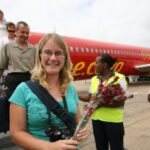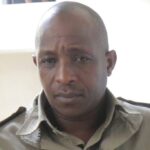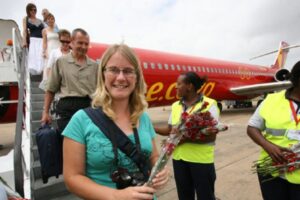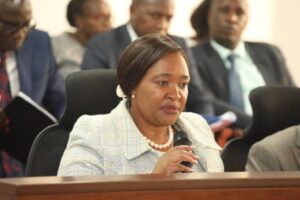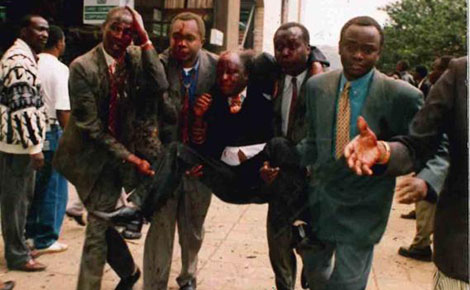
It’s already 22 years ago, how times flies?
On the 7th August 1998, Joseph Kamotho, then a KANU bigwig and Trade Minister speaks with US Ambassador Prudence Bushnell at his office near the US embassy that that time stood near the Cooperative Bank Headquarters building where the Bomb Memorial now is.
Suddenly, a loud explosion happened followed by another a huge one, shaking the building, an adjacent building, the Ufundi Cooperative comes tumbling down, Coop Bank HQ remains standing but all glass windows shattered, the US embassy too, remains standing but all its windows are gone.
Over 213 people lost their lives, thousands injured.
Kamotho narrated to Standard Group the events of that day in 2014:
I was hosting the US Ambassador in my office and we had been discussing trade issues between our two countries. The discussions were over and we were having coffee when we heard something that sounded like a bomb, which was followed by a second huge explosion. We all reacted as human beings – emotionally – because we did not know what was happening.
My security detail jumped to my protection. I was very afraid.
My first instinct was to run for my life and try and find a way out of the place. I was injured in the explosion. My security team carried me down the staircase all the way to the ground floor. It was the longest journey of my life.
I remember when we reached downstairs, I was put in a vehicle that drove straight to Nairobi Hospital where I found my son Charles and other family members waiting for me. Charles was the first family member I saw and he is a medical doctor, which was reassuring.
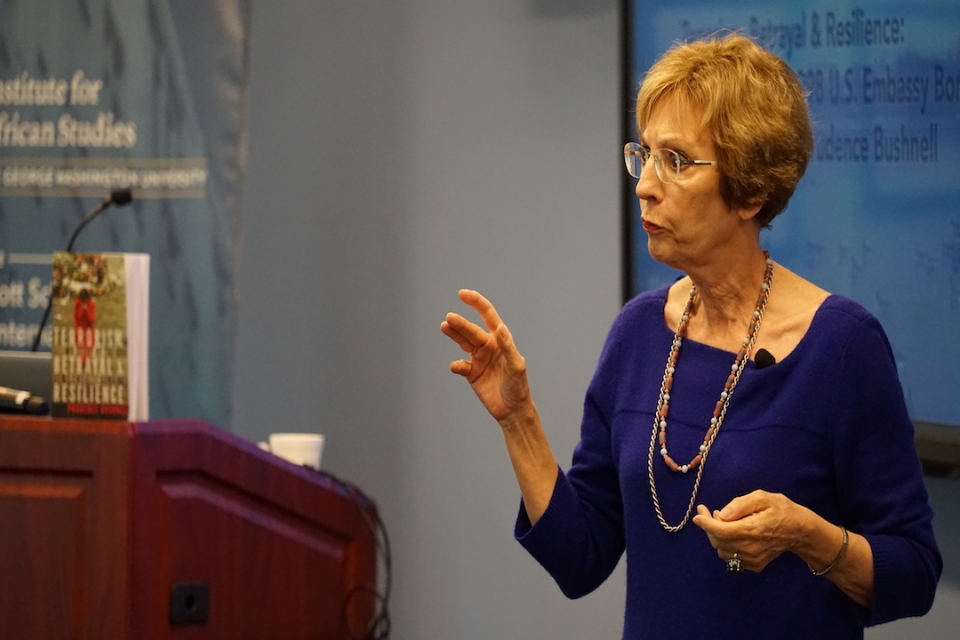
The former US ambassador went on to write a book about her experience, as narrated by GW Today in 2018
Prudence Bushnell said she repeatedly warned the State Department about potential security threats at her post in Kenya from the time she arrived in 1996.
“For two years, I kept it up, and I was told to ‘stop nagging,’” she said.
On Aug. 7, 1998, the terrorist organization al Qaeda simultaneously attacked two U.S. embassies in Africa—in Dar es Salaam, Tanzania, and Ms. Bushnell’s post in the busy downtown area of Nairobi, Kenya.
Ms. Bushnell, who was appointed ambassador by President Bill Clinton, spoke Wednesday at the Elliott School about leadership, ethics and her recent book, “Terrorism, Betrayal and Resilience: My Story of the 1998 Embassy Bombings,” which describes her account of the bombing, as part of the school’s Global Ethics Day celebration.
“My story is about the tension between doing things right and doing the right thing,” she said. “It is also a story about policy and people, how they interact and what happens when you put one in front of the other.”
More than 200 people, including 12 Americans, died as a result of the attacks and thousands more were injured. The embassy bombings were al Qaeda’s first major strike in its war against the United States and a forerunner for the 9/11 attacks.
“My senior colleagues back in Washington were ‘doing things right’—they were staying within the starvation budget that congresses of both parties and White Houses of both parties had imposed on the Department of State,” Ms. Bushnell said.
She said compliance with the budget put lives at jeopardy.
“Rather than keep people safe, they waived security requirements,” she said.
In his introductory remarks, Elliott School Dean Rueben Brigety II said the Elliott School has renewed its commitment to the study of ethics with the launch of its required one-credit leadership, ethics and practice (LEAP) initiative this year.
“We want to spend [students’] crucial years here helping to inform their moral intuition so they know what ‘doing the right thing feels like,’” he said.
Dr. Brigety said in order to do this, the school strives to create outlets for students to learn directly from world leaders.
Ms. Bushnell is the first of nine speakers who will visit the school this semester to speak as part of the LEAP program’s speaker series.
“Ambassador Prudence Bushnell displayed extraordinary leadership during, before and after the tragedy,” he said. “She has devoted much of the past 20 years to healing and remembrance.”
In her book, Ms. Bushnell suggests that U.S. leaders missed clues that may have possibly allowed for the prevention of subsequent embassy bombings and other attacks against the United States by the terrorist group.

“By Labor Day 1998, we were old news,” she said.
She said the administration responded to the bombings with missile attacks and a “narrow” Accountability Review Board report, which focused on security issues rather issues of policy failure.
“Other than that, there was no congressional hearing, no after-action review, no lessons learned—nothing—until our lives forever changed on Sept. 11,” Ms. Bushnell said. “Had anyone done an after-action review, Sept. 11 may have turned out differently.”
In examination of the 9/11 Commission Report and trial transcripts, she said she “teased out” information collected by nearly half a dozen U.S. intelligence agencies up until the embassy bombings.
“There was information within the agencies of Washington [in 1998] to probably safeguard us had that information been shared with one another, me, as the ambassador, and Kenyan intelligence,” she said.
She said the thousands of U.S. soldiers lost, trillions of dollars spent and millions of lives disrupted as a result of conflict with terrorist organizations like al Qaeda are the “breadcrumbs leading from Nairobi to today.”
“We still don’t have a no-fault process of looking at policy failures,” she said. “If we did, maybe we would find some other way of fighting a war because you’re not going to kill an ideology with bullets or stop a tactic against civilians with a war.”
To students, she said as the upcoming generation of leaders in international affairs they will have to develop new ways deal with the issues of terrorism and other pressing global matters.
“It helps to have senior leaders who are going to provide the attention and the resources, but you don’t have to be in a senior leadership position to provide leadership,” she said. “You can start a conversation in this room right now about how can we address terrorism in a way that doesn’t rely exclusively on guns and killing people.”
She also said students can seek alternatives to the foreign service such as working for or partnering with nonprofit organizations and other private institutions with resources to address global issues.
“A mom doesn’t care whether the vaccination for her baby comes from the U.S. government or a private person,” she said.

Twin bombing
The terror group Al Qaeda led by then little-known leader, Osama Bin Laden simultaneously attacked US embassies in Kenya and Tanzania.
The mastermind in Kenya was known as Fazul Abdullah Mohammed.
Fazul Mohammed and a number of others were under indictment in the United States for their alleged participation in the 1998 bombings but he wold escape justice.
He was killed in Somalia on June 8th 2011.
READ MORE FROM THE TWITTER LINK BELOW
#HistoryKeThread At around the time of this thread, at 1030HRS twenty years ago, on 7th August 1998, guards at the rear entrance of the United States of America embassy building in downtown Nairobi waved down a truck for routine inspection. It was halted as its occupants… pic.twitter.com/1KNLM4DkgV
— H i s t o r yKE (@HistoryKE) August 7, 2018

